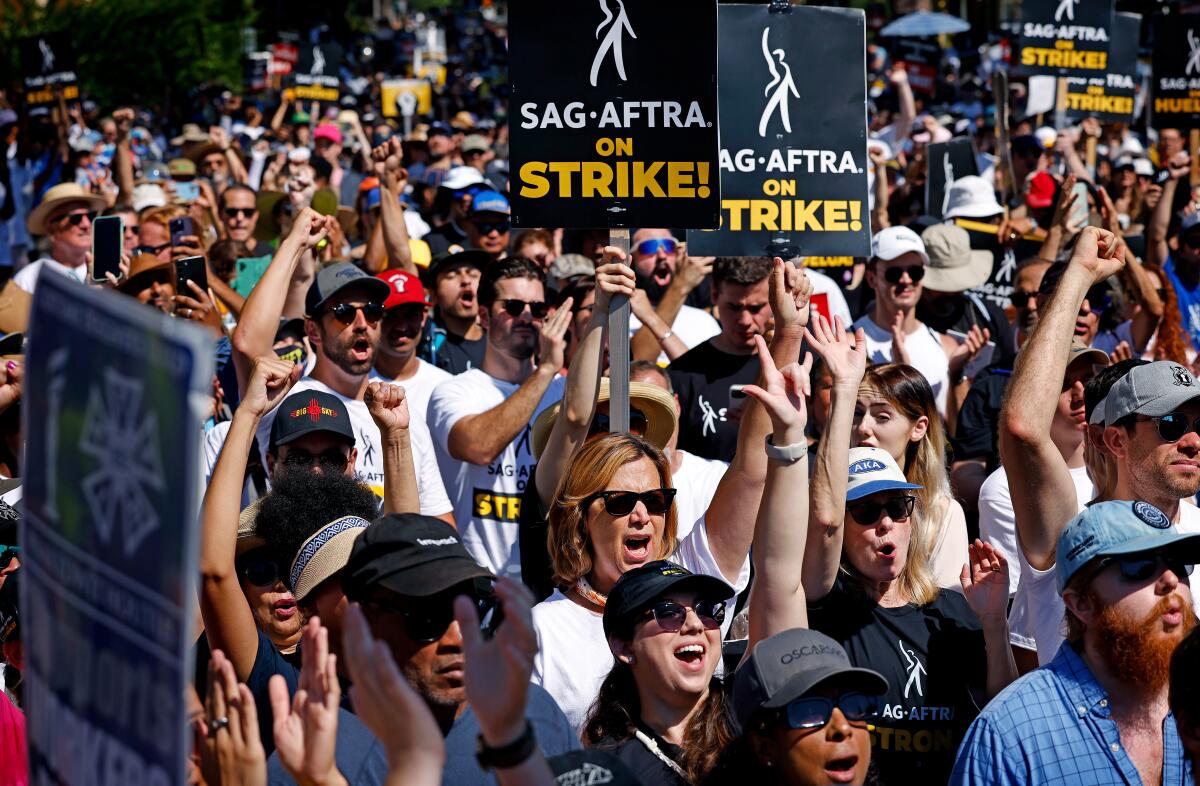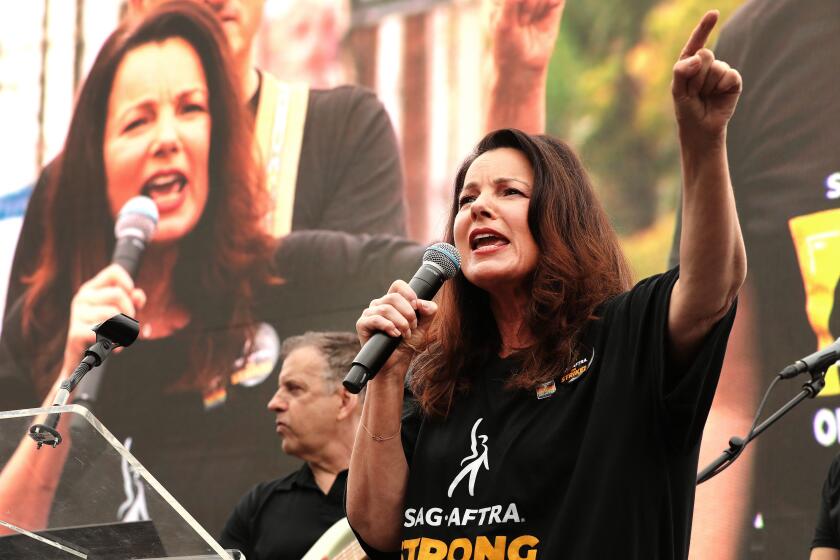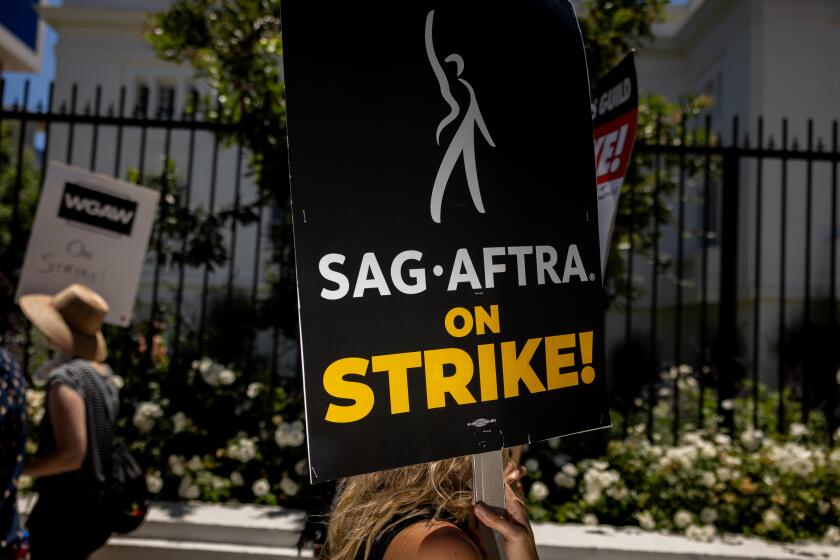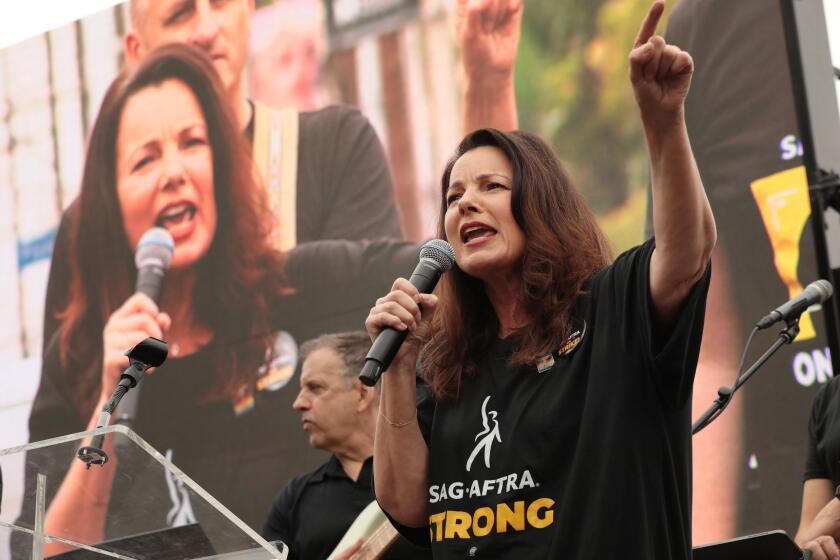SAG-AFTRA members easily ratify new contract after actors’ strike

- Share via
Members of performers union SAG-AFTRA have voted in favor of the contract that ended the actors’ strike, following a weeks-long ratification period that saw a number of actors voice concerns about the new deal.
The ratification vote, which was expected, marks the end of Hollywood’s extraordinary season of labor discontent that caused widespread disruptions across the film and TV industry.
The so-called memorandum of agreement was approved Tuesday night by a vote of 78.33% to 21.67%. Voter turnout among the union’s 160,000 members was 38.15%, according to the guild.
“Today we close out one of the most important chapters in recent entertainment industry history,” the union said in a statement posted on X, formerly known as Twitter.
The verdict from membership was decisive, marking the second-highest margin of approval since the Screen Actors Guild and the American Federation of Television and Radio Artists merged in 2012. For context, 74% of voters approved the guild’s TV/Theatrical contract in 2020; 76% voted in favor in 2017; and 92% voted “yes” in 2014.
The document was first recommended by SAG-AFTRA’s negotiating committee and national board of directors after the union and the alliance representing the major Hollywood studios reached a tentative settlement in early November, ending the 118-day walkout.
SAG-AFTRA has released the full draft agreement it reached with the major studios that ended the 118-day actors’ strike earlier this month.
“The AMPTP member companies congratulate SAG-AFTRA on the ratification of its new contract, which represents historic gains and protections for performers,” the alliance said in a statement. “With this vote, the industry and the jobs it supports will be able to return in full force.”
SAG-AFTRA National Executive Director and Chief Negotiator Duncan Crabtree-Ireland said he was “thrilled” to see the deal pass, noting that he was “particularly pleased” that nearly 40% of members cast their ballots — the highest level of participation in a contract-ratification vote in SAG-AFTRA history.
“This is a deal that I really believe in, and I’m so happy to see that the vast majority of SAG-AFTRA members also believe in it,” Crabtree-Ireland told The Times. “We have a robust democracy. The members had a very strong debate over the last few weeks about this deal, and I think it’s clear that our members took the time to educate themselves and really understand what the issues are.”
“That’s not to say that this deal gives us everything we ever need,” he added. “It is one step in a process of collective bargaining that’s been going on since 1937 and will continue to go on into the future.”
The new three-year film and TV contract includes wage increases, streaming bonuses, regulations around casting and auditions, updated equity and inclusion practices and safeguards against sexual harassment. Guild leaders have valued the deal at more than $1 billion.
The agreement also establishes myriad artificial intelligence protections, requiring employers to obtain “clear and conspicuous” consent from performers before creating and using “digital replicas” of them for a project. When using their digital replicas, employers must also pay performers for the time they would have otherwise worked in person.
Still, some actors have complained that the protections outlined in the contract — particularly those related to AI — don’t go far enough.
SAG-AFTRA leaders Crabtree-Ireland and Fran Drescher have repeatedly defended and championed the agreement, which was unanimously recommended by the negotiating committee and approved by 86% of the national board.
The fervent discourse about the AI terms “was an important dialogue and discussion,” Crabtree-Ireland said Tuesday. “This is a ongoing fight that ultimately we’re all on the same side of — which is to make sure actors are treated fairly. And I’m very eager to keep working with all of the folks who spoke out very passionately, even if they weren’t in support of this agreement.”
SAG-AFTRA has approved a deal from the studios to end its historic strike. The actors were on strike for more than 100 days.
SAG-AFTRA released the full 128-page draft of the agreement to members more than a week before the voting window closed — an unprecedented move by the union, which typically releases only a summary of the contract before ratification. Guild leaders opted to rush the process this year under pressure from some members who weren’t satisfied with the abridged version published Nov. 12.
“I hope to ratify the contract that promises to carve a new future for every community represented,” Drescher said in a video message to members shortly before the full draft came out.
“But I want you to make sure that you make an informed decision. ... Your vote matters. You matter. This contract speaks volumes to that point. I appreciate your due diligence and trust you will come up with the right conclusion that supports, like never before, both you and your fellow SAG-AFTRA members.”
Los Angeles prop houses took a huge hit during the Hollywood writers’ and actors’ strikes. Now they’re preparing for the return of production.
Several prominent members of the performers union publicly shared their opinions on the contract in the days leading up to the final vote count.
Jessica Chastain (“Zero Dark Thirty,” “The Eyes of Tammy Faye”) and Colman Domingo (“Euphoria,” “Fear the Walking Dead”) have indicated in recent interviews that they voted yes, while Kendrick Sampson (“Insecure,” “How to Get Away With Murder”) declared on Instagram that he was voting no because he felt there was not “enough leverage in this contract to outsmart the few who hold all the resources.”
“I do think, personally, it is a good deal,” Chastain told reporters at the Marrakech International Film Festival. “But, of course, I only have one vote, and it’s important to me what everyone else thinks as well. And that’s the beautiful thing about taking a vote. ... Everyone gets to have a say.”
Hollywood’s twin strikes translated into a lost year of production for much of the industry with productions idle since last spring. SAG-AFTRA’s strike against major media companies stretched 118 days.
Jessica Brown, a former strike captain and background actor who has worked on “L.A.’s Finest” and “American Horror Story,” said she voted yes because she felt the negotiating team “really came through for background [actors] in terms of AI protections.”
Brown added that she was digitally scanned for a Marvel production during the COVID-19 pandemic, an experience she described as both “fascinating” and “a little frightening.”
“Background has always been impacted by ways of trying ... to duplicate [people] to get the shots that they need,” Brown told The Times. “And with the regulations that the ... contract has in place, we can actually nip it in the bud now.”
By forcing the writers’ and actors’ strikes, the studios cost the California economy more than $5 billion and caused untold anguish. Those wounds won’t heal overnight.
Among the members who voted against the contract was Brock Powell, an actor and voice artist who feels that the negotiating committee failed to make significant enough gains around AI, residuals and access to streaming metrics.
Powell fears that stunt performers and voice artists could now be “in jeopardy of losing their jobs” to AI “replicants of celebrities.”
“We often hear, ‘Well, this is the best we could do. ... We’ll get them in three years. Now’s not the time,’” Powell told The Times. “When things are given away in prior contracts ... it makes it really hard to gain things back.”
“I will not cave,” “The Nanny” star and SAG-AFTRA President Fran Drescher says in an interview, as the actors’ strike reaches 100 days. Talks with the major studios were suspended earlier this month.
Now that the SAG-AFTRA contract has been ratified, the industry can begin to move forward.
But it will take a while for the entertainment industry to fully recover from the prolonged production shutdown caused by the overlapping writers’ and actors’ walkouts, which lasted about six months combined.
Since the writers’ strike began in May, an estimated 45,000 entertainment and sound-recording industry jobs disappeared from payrolls, according to the U.S. Bureau of Labor Statistics.
Adjacent businesses — such as local florists, caterers and prop houses that film and TV productions depend on — were hit hard as well, resulting in widespread layoffs, furloughs and pay cuts.
As filming starts to ramp back up, industry insiders and experts predict that studios will create less content, slash production budgets and cut back on pricey producer deals in an effort to save money due to the economic impact of the work stoppages and rise in labor costs.
Additionally, more than a dozen movies have been pushed from 2024 to 2025 — or pulled from the release calendar altogether — because of strike-induced production delays, which could result in a lighter film slate for theaters still bouncing back from the COVID-19 pandemic, let alone the work stoppages.
More to Read
Inside the business of entertainment
The Wide Shot brings you news, analysis and insights on everything from streaming wars to production — and what it all means for the future.
You may occasionally receive promotional content from the Los Angeles Times.















